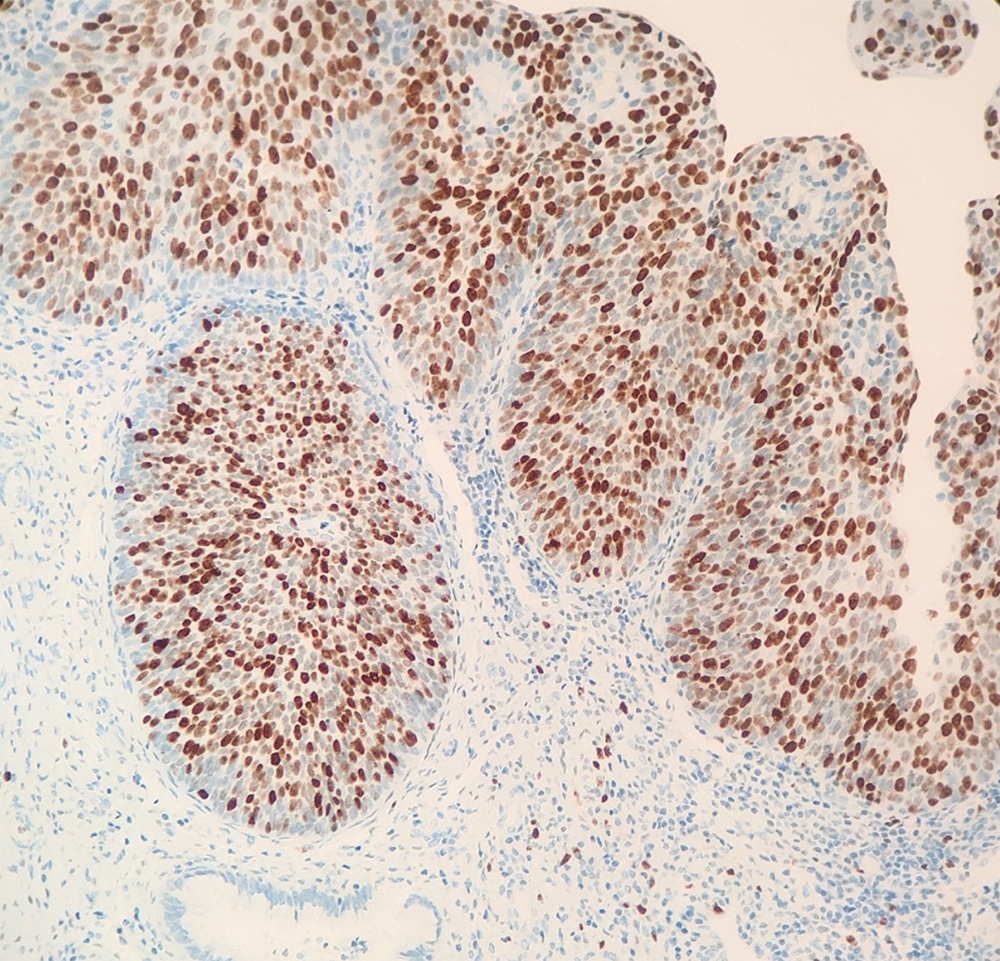
Ki-67 Antibody(DA076)
Ki-67 Antibody(DA076)
Recombinant monoclonal rabbit antibody
Description
Ki-67 is an antibody designed to target Ki-67 antigen-a nuclear protein encoded by the MKI67 gene whose presence correlates with G1, S, G2, and the mitotic phases of the cell cycle.1 Ki-67’s presence during cellular division makes it an excellent target for labeling rapidly growing malignancies.2 Given that its presence correlates with cell proliferation, the immunohistochemical labeling of Ki-67 antigen may be useful in characterizing a lesion’s growth fraction. It has been demonstrated that identifying this antigen by IHC is useful in characterizing lesions of the breast, lymphoid cells, astrocytes, and uterus.3-9
References
1. Scholzen T, et al. The Ki-67 protein: from the known and the unknown. J Cell Physiol. 2000; 182(3):311-22.
2. Sun X, et al. Ki-67: more than a proliferation marker. Chromosoma. 2018; 127(2):175-186.
3. Abd-Elazeem MA, et al. Claudin 4 expression in triple-negative breast cancer: correlation with androgen receptors and Ki-67 expression. Annals of Diagnostic Pathology 2015; 19:37-42.
4. Inwald EC, et al. Ki-67 is a prognostic parameter in breast cancer patients: results of a large population-based cohort of a cancer registry. Breast Cancer Res Treat. 2013; 139(2):539-552.
5. Ning J, et al. The impact of Ki-67 in the context of multidisciplinary care in primary inflammatory breast cancer. J Cancer. 2019; 10(12):2635-2642.
6. Broyde A, et al. Role and prognostic significance of the Ki-67 index in non-Hodgkin's lymphoma. Am J Hematol. 2009; 84(6):338-43.
7. Chuang SS, et al. Histopathology and immunohistochemistry in distinguishing Burkitt lymphoma from diffuse large B-cell lymphoma with very high proliferation index and with or without a starry-sky pattern: a comparative study with EBER and FISH. Am J Clin Path 2007 128(4):558-64.
8. Shivaprasad NV, et al. Ki-67 immunostaining in astrocytomas: Association with histopathological grade- A South Indian Study. J Neurosci Rural Pract. 2016 7(4):510-514.
9. Mayerhofer K, et al. Ki-67 expression in patients with uterine leiomyomas, uterine smooth muscle tumors of uncertain malignant potential (STUMP) and uterine leiomyosarcomas (LMS). Acta Obstet Gynecol Scand. 2004; 83(11):1085-8.
2. Sun X, et al. Ki-67: more than a proliferation marker. Chromosoma. 2018; 127(2):175-186.
3. Abd-Elazeem MA, et al. Claudin 4 expression in triple-negative breast cancer: correlation with androgen receptors and Ki-67 expression. Annals of Diagnostic Pathology 2015; 19:37-42.
4. Inwald EC, et al. Ki-67 is a prognostic parameter in breast cancer patients: results of a large population-based cohort of a cancer registry. Breast Cancer Res Treat. 2013; 139(2):539-552.
5. Ning J, et al. The impact of Ki-67 in the context of multidisciplinary care in primary inflammatory breast cancer. J Cancer. 2019; 10(12):2635-2642.
6. Broyde A, et al. Role and prognostic significance of the Ki-67 index in non-Hodgkin's lymphoma. Am J Hematol. 2009; 84(6):338-43.
7. Chuang SS, et al. Histopathology and immunohistochemistry in distinguishing Burkitt lymphoma from diffuse large B-cell lymphoma with very high proliferation index and with or without a starry-sky pattern: a comparative study with EBER and FISH. Am J Clin Path 2007 128(4):558-64.
8. Shivaprasad NV, et al. Ki-67 immunostaining in astrocytomas: Association with histopathological grade- A South Indian Study. J Neurosci Rural Pract. 2016 7(4):510-514.
9. Mayerhofer K, et al. Ki-67 expression in patients with uterine leiomyomas, uterine smooth muscle tumors of uncertain malignant potential (STUMP) and uterine leiomyosarcomas (LMS). Acta Obstet Gynecol Scand. 2004; 83(11):1085-8.
Specifications
Application:
IHC (FFPE)
Host:
Rabbit
Subclass:
IgG
Immunogen:
Synthetic peptide from human Ki67
Cellular location:
Nucleus
Control:
Tonsil
Order information
| RMA1A020 | Concentrate | IVD(R) |
| RMA1A020 | 10 ml Ready to use | IVD(R) |
| RMA1A020 | 6 ml Ready to use | IVD(R) |
| RMA1A020 | 3 ml Ready to use | IVD(R) |


